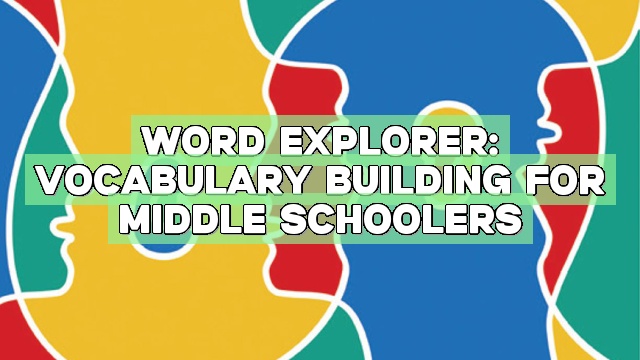Building a strong vocabulary is an essential skill for middle school students. It not only improves their language arts skills but also enhances their confidence in communication. Students who have a rich vocabulary are better equipped to express themselves clearly, understand complex texts, and excel in academic and professional settings. In this article, we will explore effective strategies and vocabulary building prompts for middle school students.
Key Takeaways
- Vocabulary building is crucial for middle school students to enhance their language skills and academic performance.
- Effective vocabulary building strategies include reading widely, using context clues, creating word lists, and engaging in word games and activities.
- Practical tips for incorporating vocabulary building into daily routine include using vocabulary notebooks, practicing word usage in writing, and engaging in vocabulary quizzes or challenges.
- Subject-specific vocabulary building and preparing for standardized tests are also important.
- Tracking progress and celebrating success can help students stay motivated and grow their vocabulary.
Why Vocabulary Building Matters
Vocabulary building is a crucial aspect of language arts development for middle school students. It involves actively learning and increasing the number of words one can use and understand in everyday conversation, writing, and reading. Building vocabulary enhances students‘ understanding of the English language, which is a fundamental element of their overall academic performance.
Research has shown that students who have a strong vocabulary perform better in all areas of language arts, including reading comprehension, writing, and critical thinking. Vocabulary building is also essential in preparing middle school students for future academic and career success, as it is a fundamental aspect of confident communication.
By expanding their vocabulary, middle school students can express their thoughts and ideas more clearly, critically analyze texts, and understand complex concepts with ease. Additionally, developing a rich vocabulary creates opportunities for more creative writing and effective communication in different settings.
Why Vocabulary Building Matters: Examples and Evidence
A study conducted by the Educational Testing Service found that students who had a strong vocabulary score higher on standardized tests and have better reading comprehension skills than those with a limited vocabulary. Another study by the National Assessment of Educational Progress indicated that students who read at or above grade level have a more extensive vocabulary than those who read below grade level.
Furthermore, as students progress in their education, they encounter more complex texts and academic terms. Without adequate vocabulary, these materials can become challenging and cause them to struggle academically. In contrast, when students have a rich vocabulary, they can comprehend and analyze complex texts with ease, leading to academic success.
In conclusion, vocabulary building plays a critical role in the overall academic achievement and future success of middle school students. Mastery of the English language through consistent vocabulary building can boost students’ confidence in communication, improve their performance in language arts, and prepare them for a successful academic and professional future.
Effective Vocabulary Building Strategies
Building vocabulary is an essential skill for middle school students to enhance their language arts abilities. It is also crucial for their academic and future success. Here are some effective strategies that middle school students can use to build their vocabulary:
1. Reading widely
Reading different types of texts encourages exposure to diverse language patterns and themes. Students should read books, magazines, articles, and other materials. They can keep a vocabulary notebook to record new words and their meanings.
2. Using context clues
Context clues are the words and phrases surrounding an unfamiliar word that provide hints to its meaning. Encourage students to look for context clues in texts to help them understand the meaning of new words. This technique also helps students improve their reading comprehension skills.
3. Creating word lists
Students can keep a list of words they encounter in different contexts. They can organize the list alphabetically or by categories, such as synonyms or antonyms. The act of writing a word down and associating it with its meaning helps with retention and recall.
4. Engaging in word games and activities
Games and activities offer a fun and interactive way to build vocabulary. Students can play games like Scrabble, Boggle, or Bananagrams. They can also participate in word puzzles, crosswords, or word search activities. Online resources like vocabulary quizzes, flashcards, or word-of-the-day calendars can also be helpful.
Implementing these strategies can enhance their vocabulary building skills, which will help students in their language arts and across their academic careers.
Incorporating Vocabulary Building in Daily Routine
Building vocabulary is a process that requires consistent practice and effort. Middle school students can easily incorporate vocabulary building in their daily routine by using simple yet effective strategies. By doing so, they can reinforce their language learning and expand their word power in a meaningful way.
Use Vocabulary Notebooks
Encourage middle school students to create and maintain a vocabulary notebook to record new words they learn. They can jot down the definitions, parts of speech, and example sentences for each new word. By revisiting the notebook regularly, they can reinforce their learning and solidify new vocabulary in their memory.
Practice Word Usage in Writing
Encourage students to practice using new vocabulary in their writing assignments. By incorporating new words in their everyday academic work, they can improve their writing skills and develop a better understanding of how words work in context. Teachers can provide prompts that encourage the use of specific words or challenge students to incorporate a set number of new words in each essay or assignment.
Engage in Regular Vocabulary Quizzes or Challenges
Organize regular vocabulary quizzes or challenges to keep students motivated and engaged. These quizzes can be conducted in class or online using available resources. This will help students to monitor their progress and focus on their weak points. Regular quizzes will also create an atmosphere of competition, which will further motivate the students.
Vocabulary Building Prompts and Examples
Vocabulary building prompts can be an effective way to enrich a middle school student’s lexicon while also developing their critical thinking and creativity skills. These prompts can be approached in various ways and can be carried out both inside and outside the classroom. Here are some vocabulary building prompts and examples that can help middle school students improve their word power:
Prompt 1: Word Association
Choose a word from a list of five words given, then provide five other words that are associated with that particular word. For example, if the prompt word is “ocean,” the associated words could be “waves,” “beach,” “saltwater,” “whales,” and “tides.”
Prompt 2: Word Choice
Select a word from a list of five words given, then write a brief paragraph that includes the chosen word in a well-structured sentence that adequately describes its meaning. For example, if the prompt word is “magnify,” the paragraph could read, “The scientist used a microscope to magnify the cells, making it easier to study them in detail.”
Prompt 3: Word Creation
Create a new word and write a brief definition for it. The word should have a meaning that is not already covered by an existing word. For example, if the invented word is “blustigrade,” the definition could read, “Walking with one’s head held high and chest puffed out, despite being unsure or nervous.”
These prompts can be adjusted to suit different levels of language and age groups. They are a great way to encourage students to come up with original and creative ways of using the words they have learned. Vocabulary building is a continuous process that requires regular practice. The goal is to create a lifelong passion for expanding one’s dictionary, which can open up new horizons and allow for effective communication.
Building Vocabulary for Specific Subjects
In addition to building a strong overall vocabulary, middle school students may benefit from focusing on subject-specific vocabulary related to their academic studies. Knowing key concepts, terms, and jargon related to a particular subject can improve a student’s comprehension, analysis, and communication skills. Here are some tips and prompts for building subject-specific vocabulary:
| Subject | Strategy |
|---|---|
| Science | Use flashcards to memorize scientific terms and their meanings. Look for connections between words and their roots or prefixes/suffixes. Read science articles and texts to expose yourself to subject-specific vocabulary in context. |
| History | Identify key historical events and figures and learn their associated vocabulary. Practice using vocabulary in historical analyses and essays. Watch documentaries or historical films to listen for subject-specific vocabulary. |
| Math | Focus on learning mathematical operations, symbols, and concepts. Create visual aids such as diagrams and graphs to help with understanding. Use online resources or textbooks to look up definitions and examples of mathematical terms. |
| Literature | Read books and classic works of literature to enhance vocabulary in different genres. Pay attention to literary devices such as metaphors, similes, and symbolism, and the vocabulary used to describe them. Write book reviews and literary analyses to practice using subject-specific vocabulary. |
By building subject-specific vocabulary, middle school students can deepen their understanding of key concepts and improve their performance in class. They can also prepare themselves for future academic studies and careers in specific fields. Remember to use a variety of strategies and resources to learn subject-specific vocabulary, and practice using the terms in writing and speaking to solidify your understanding.
Vocabulary Building for Standardized Tests
Building a strong vocabulary is crucial for success in standardized tests, such as the SAT, ACT, and GRE. These exams often assess a student’s ability to understand and use complex vocabulary in context. By enhancing their vocabulary, middle school students can improve their chances of performing well in these tests and eventually gaining admission to their desired colleges.
One effective strategy for expanding test-specific vocabulary is to practice with standardized test prompts and practice tests. These materials often include challenging vocabulary words and phrases, allowing students to become familiar with the language they may encounter on test day. Additionally, using vocabulary-building apps or flashcards can help students memorize and retain new words.
Another useful technique is to read high-quality literature, such as classic novels or nonfiction books. These texts often contain advanced vocabulary and complex sentence structures, exposing students to new words in context. Encouraging students to keep a vocabulary notebook and write down new words they encounter in their reading can also help with retention and application.
To make vocabulary building more engaging and interactive, educators can create classroom games and challenges related to standardized test vocabulary. For example, students can play vocabulary bingo using test-specific words or participate in a vocabulary quiz bowl competition. These activities not only make learning more fun, but also help students reinforce their knowledge and test-taking skills.
Overcoming Vocabulary Building Challenges
Building a strong vocabulary can be challenging for middle school students. However, with consistent practice and the right techniques, overcoming these obstacles is possible.
Dealing with unfamiliar word structures
One common challenge that students face while building vocabulary is encountering unfamiliar word structures. It can be daunting to come across words with complex prefixes, suffixes, or roots. One way to overcome this challenge is to break down the word into its components and learn the meanings of each part. For instance, the word “unprecedented” can be divided into “un-” (not), “precedent” (past example), and “-ed” (past tense). This process can help students identify the meaning of the word and retain it better.
Memorization techniques
Remembering new words can also be a daunting task for middle school students. While rote memorization may seem like a tedious method, it can be effective if done right. Flashcards, mnemonics, and visualization techniques can help students memorize new words and their meanings. For example, creating flashcards with images or associating new words with familiar objects or scenarios can help students remember the words better.
Another effective technique is to use the new words in writing. Writing sentences or short stories using new words can help students understand their usage and retain them better.
With the right techniques and consistent practice, middle school students can overcome vocabulary building challenges and improve their language skills.
Expanding Vocabulary Beyond the Classroom
While it’s critical to practice vocabulary building during language arts classes, it’s equally essential to extend learning beyond the bounds of the classroom. As middle school students seek to expand their word power, independent exploration and engagement with language can be incredibly valuable.
One useful way to explore vocabulary learning beyond the classroom is to find resources that students can access on their own. Encourage students to read a variety of books and articles, from classic literature to modern news. Watching educational videos and documentaries can also help build vocabulary in specific areas such as science or history.
Online resources can also provide an interactive way for students to engage with language independently. Interactive word games like crossword puzzles, word search, and hangman can provide an engaging way for middle school students to practice vocabulary. In addition, many language learning websites offer vocabulary building exercises designed specifically for middle school students.
Finally, It’s crucial that students track their progress and celebrate successes. Encourage students to maintain a vocabulary notebook, where they can record new words, definitions, and usage examples. Celebrate achievements by setting vocabulary learning goals and rewarding students when they reach them.
Tracking Progress and Celebrating Success
Vocabulary building is a gradual process that requires consistency and commitment. To ensure that your efforts are paying off, it’s essential to track your progress and celebrate your successes along the way. Here are some tips to help you monitor your vocabulary growth and stay motivated:
| Tip | Description |
|---|---|
| Keep a vocabulary notebook | Record all new words you encounter, along with their meanings and example sentences. Review your notebook regularly to reinforce your learning. |
| Practice word usage in writing | Use new words in your writing assignments, such as essays, reports, or creative writing pieces. This will help you internalize the words and remember them better. |
| Engage in regular vocabulary quizzes or challenges | Test your knowledge by taking vocabulary quizzes or challenges regularly. This will help you identify areas where you need improvement and reinforce your learning. |
| Set vocabulary goals | Set specific goals, such as learning a certain number of words per week or mastering a particular subject-specific vocabulary. Track your progress and adjust your goals accordingly. |
| Reward yourself for reaching milestones | Celebrate your achievements by rewarding yourself with something you enjoy, such as a favorite snack or activity. This will motivate you to continue building your vocabulary. |
Remember that building vocabulary is a process that takes time and effort. Don’t get discouraged if you don’t see immediate results. Stay committed to your practice and celebrate your successes along the way. Before you know it, you’ll have a robust vocabulary that will enhance your language skills, academic performance, and future success.
Conclusion
Building vocabulary is a crucial aspect of language arts for middle school students. It not only enhances language skills but also facilitates academic performance and future success. Effective vocabulary building strategies include reading widely, using context clues, creating word lists, and engaging in word games and activities. These strategies can be incorporated into daily routines through vocabulary notebooks, practicing word usage in writing, and regular vocabulary quizzes or challenges.
Subject-specific vocabulary is equally important and can be built through subject-related books and resources. Likewise, developing vocabulary for standardized tests can significantly improve students’ test performance. Overcoming vocabulary building challenges such as unfamiliar words or word structures can be tackled through memorization techniques and consistent practice. Extending vocabulary building beyond the classroom can enhance students’ word power through reading, watching educational videos or engaging in online word games.
Tracking Progress and Celebrating Success
Tracking progress and celebrating milestones is a crucial aspect of vocabulary building. Encouraging students to monitor vocabulary growth, set goals, and reward achievements fosters motivation and engagement. Regularly reflecting on progress and staying motivated can inspire students to explore and expand their word power.
Parents and teachers play a significant role in helping students build their vocabulary. Providing students with a range of vocabulary building prompts and strategies can support their learning and foster their language development. By consistently engaging in vocabulary building activities, middle school students can enhance their language skills and confidently communicate in any context.
FAQ
Q: What is vocabulary building?
A: Vocabulary building refers to the process of actively learning and acquiring new words and their meanings in a language. It involves expanding one’s word bank and improving language skills.
Q: Why is vocabulary building important for middle school students?
A: Vocabulary building is crucial for middle school students as it enhances their language arts skills and overall academic performance. It helps them communicate confidently, understand complex texts, and express their thoughts effectively.
Q: What are some effective vocabulary building strategies for middle school students?
A: Middle school students can employ various strategies to build their vocabulary such as reading widely, using context clues to understand unfamiliar words, creating word lists, and engaging in word games and activities.
Q: How can middle school students incorporate vocabulary building into their daily routine?
A: Middle school students can incorporate vocabulary building into their daily routine by using vocabulary notebooks, practicing word usage in writing, and engaging in regular vocabulary quizzes or challenges.
Q: Are there specific prompts and examples for vocabulary building for middle school students?
A: Yes, there are vocabulary building prompts specifically designed for middle school students. These prompts encourage critical thinking, creativity, and language exploration. Examples of chatGPT-generated responses can demonstrate the potential learning outcomes.
Q: How can middle school students build subject-specific vocabulary?
A: Middle school students can build subject-specific vocabulary by focusing on vocabulary related to various subjects such as science, history, math, and literature. Tips and prompts can help them expand their knowledge in these specific areas.
Q: How can a strong vocabulary benefit middle school students in standardized tests?
A: A strong vocabulary can benefit middle school students in standardized tests by improving their comprehension, enabling them to understand complex questions, and helping them choose correct answers. Strategies and prompts can help expand their test-specific vocabulary.
Q: What are some common challenges in vocabulary building for middle school students?
A: Middle school students may face challenges such as unfamiliar word structures or difficulties with memorization. Practical solutions and advice can help them overcome these challenges and continue building their vocabulary effectively.
Q: How can middle school students expand their vocabulary beyond the classroom?
A: Middle school students can expand their vocabulary beyond the classroom by engaging in activities such as reading books, watching educational videos, or playing online word games. These independent explorations can further enhance their word power.
Q: How can middle school students track their vocabulary building progress?
A: Middle school students can track their vocabulary building progress by monitoring the number of new words learned, setting goals for vocabulary growth, and reflecting on their achievements. Celebrating milestones can also help them stay motivated.
Q: What is the significance of vocabulary building for middle school students?
A: Vocabulary building is significant for middle school students as it contributes to their language skills, academic performance, and future success. It equips them with the tools necessary for effective communication and confident expression.









